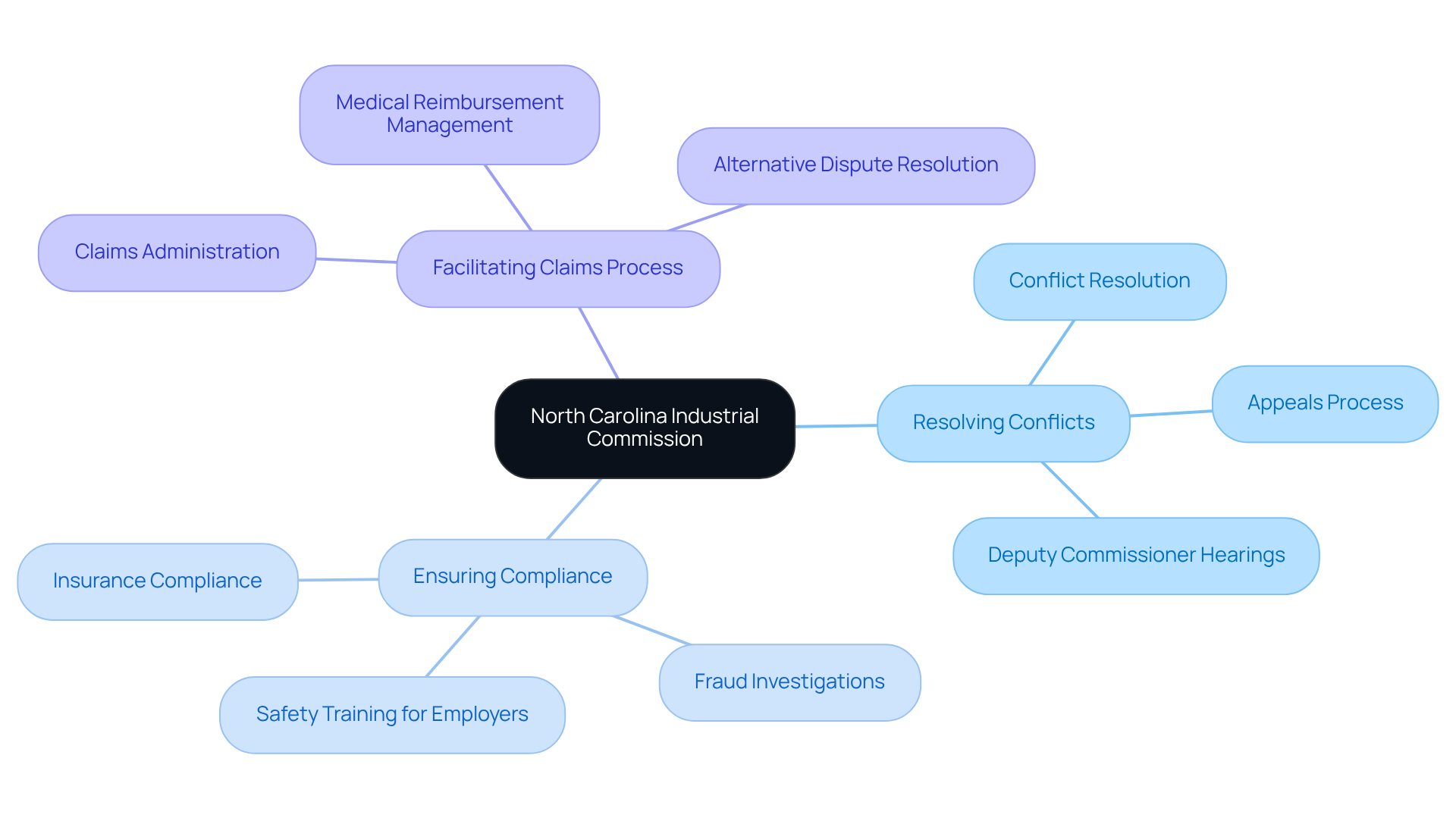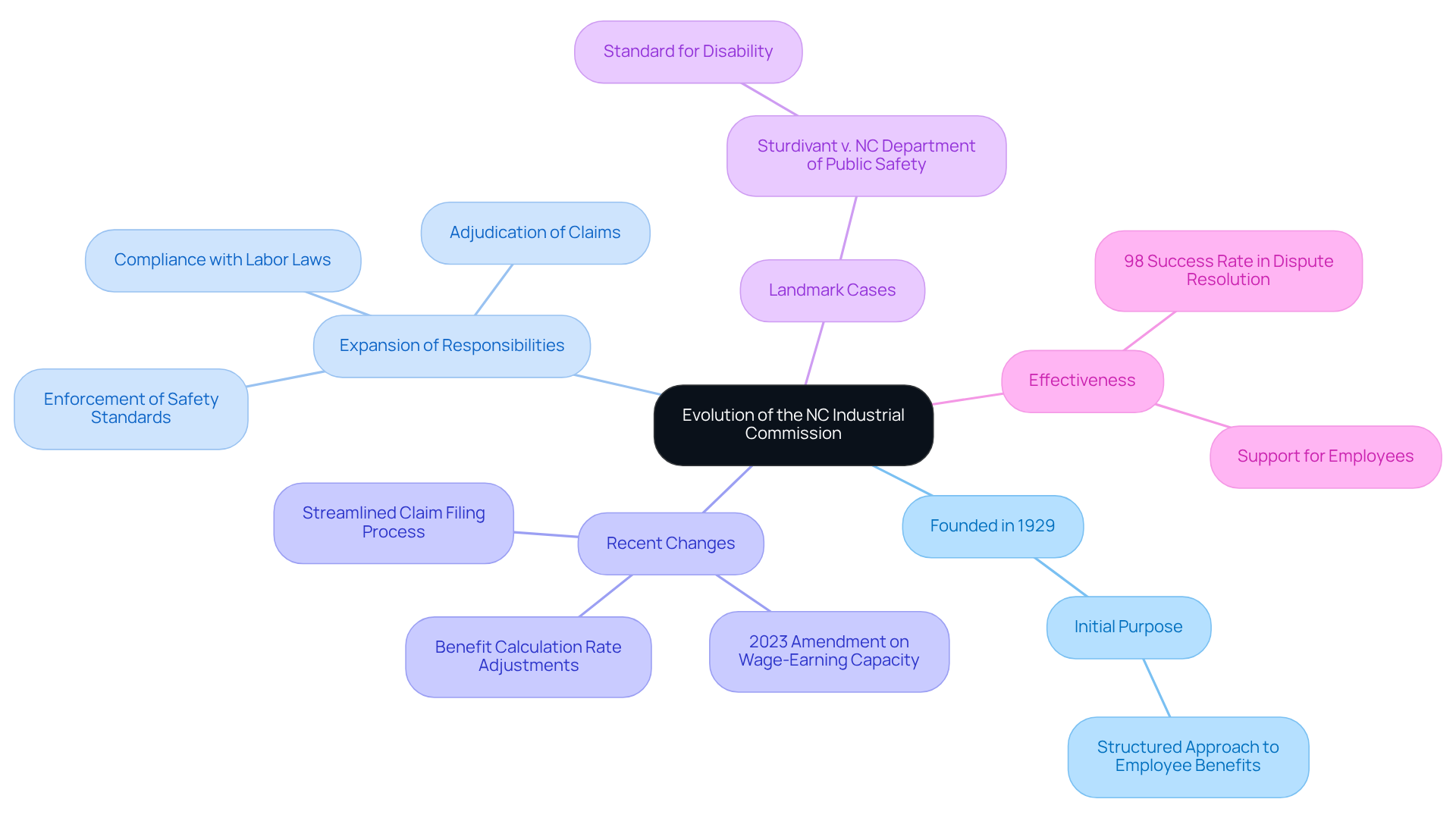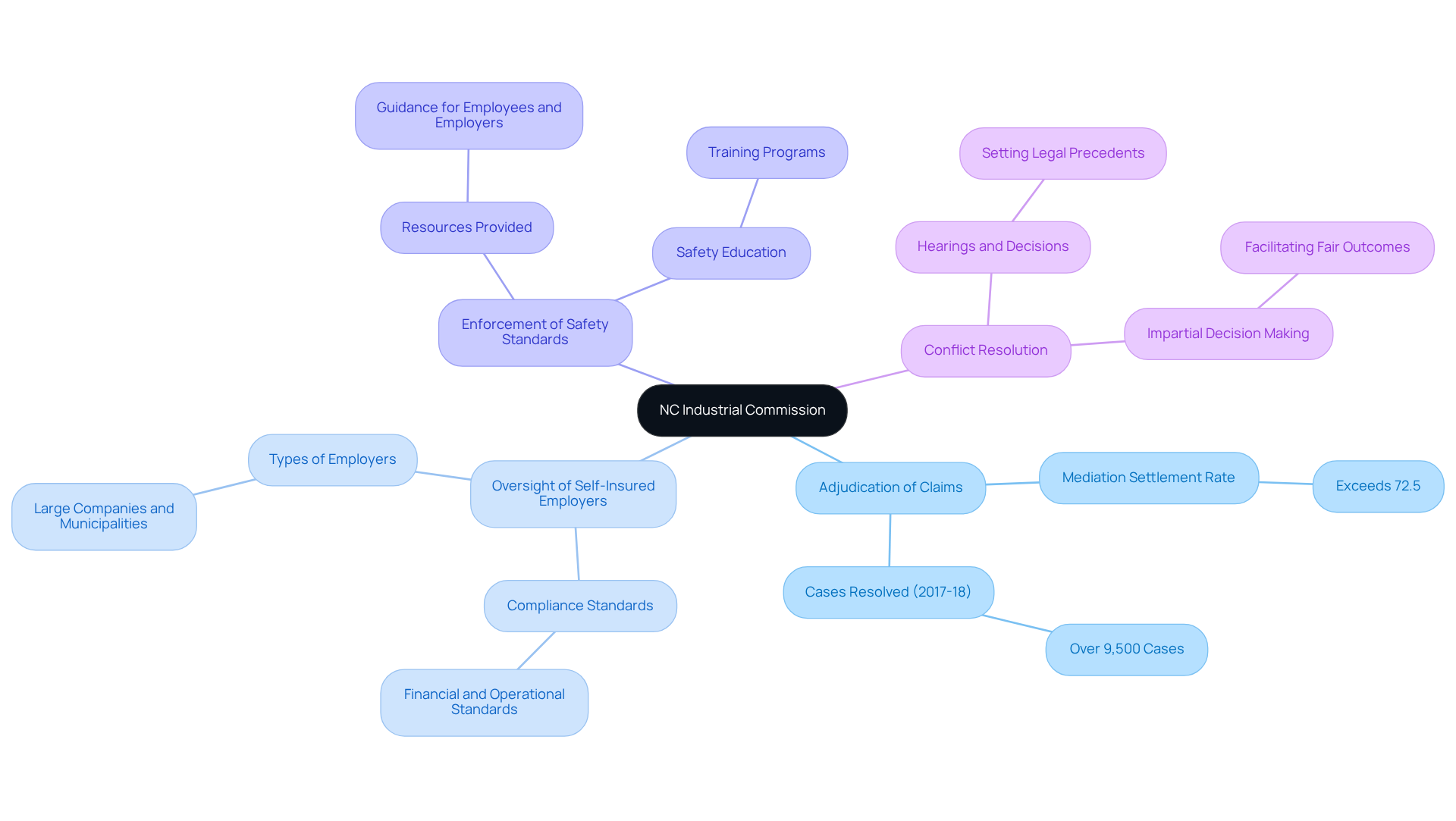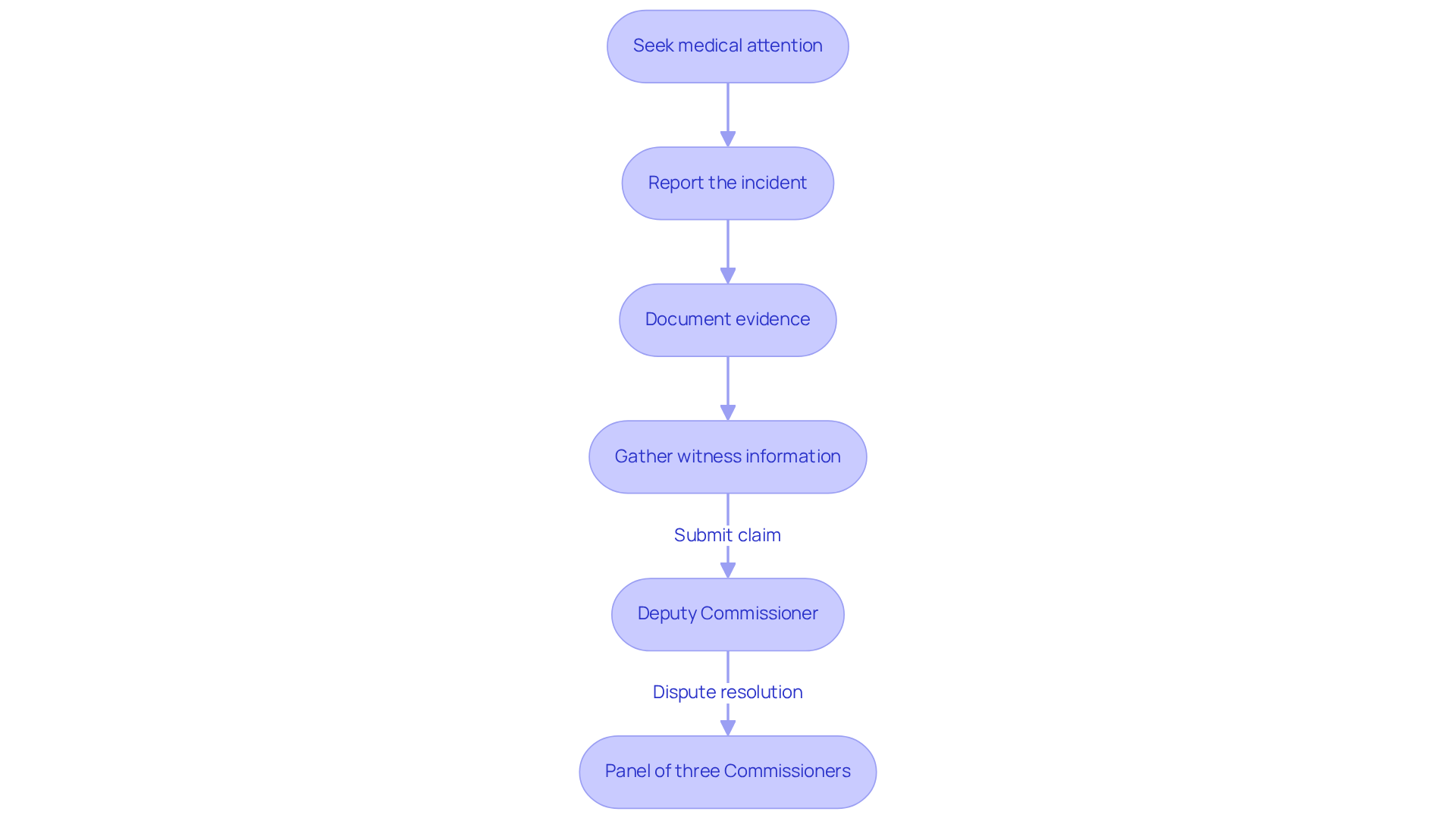Overview
The North Carolina Industrial Commission (NCIC) stands as a vital guardian of employee benefits, ensuring fair compensation for workplace injuries and illnesses. Have you ever felt overwhelmed by the complexities of workers' compensation? The NCIC is here to help. Through its essential functions—conflict resolution, compliance enforcement, and the management of claims—it demonstrates unwavering commitment to protecting employees' rights and fostering safety in the workplace.
Remember, you are not alone in this fight; the NCIC is dedicated to standing by your side, ensuring your voice is heard and your rights are upheld.
Introduction
The North Carolina Industrial Commission is a vital pillar of workplace safety and employee rights, ensuring that those injured on the job receive the support and compensation they deserve. By navigating the complexities of workers' compensation claims, the Commission not only resolves disputes but also enforces essential safety regulations that protect employees throughout the state.
But with evolving laws and recent amendments, how can both workers and employers truly understand their rights and responsibilities in this intricate system? This article explores the crucial functions and historical significance of the NC Industrial Commission, illuminating its pivotal role in the landscape of labor law in North Carolina.
We’re in this fight together.
Defining the North Carolina Industrial Commission: Purpose and Importance
The NC Industrial Commission is a vital state organization dedicated to overseeing employees' benefit regulations in North Carolina. Its mission is clear: to ensure that individuals who have been harmed receive fair compensation for job-related injuries and illnesses. The NCIC plays a pivotal role in:
- Resolving conflicts between workers and management
- Ensuring compliance with state regulations
- Facilitating an organized claims process
For instance, the NCIC's enforcement of employer insurance compliance protects employees by ensuring that employers maintain necessary coverage for workplace injuries. Recent updates, such as the extension of filing deadlines due to severe weather, demonstrate the organization's responsiveness to the needs of injured individuals.
Understanding the NC Industrial Commission's functions is essential for both employees and employers, as it directly impacts the rights and obligations of all parties involved in workplace injuries. The agency's management of medical reimbursement and benefits, along with its semi-judicial power in disputes, underscores its significance in the laborers' indemnity landscape in North Carolina.
We’re here to and ensure you’re not alone in this process.

Historical Context: The Evolution of the NC Industrial Commission
Founded in 1929, the North Carolina Industrial Authority (NCIA) emerged as a crucial response to the pressing need for a structured approach to employee benefits. Initially tasked with limited responsibilities, this organization has significantly expanded its role over the years. Today, it encompasses the adjudication of claims, enforcement of safety standards, and oversight of compliance with labor laws. This transformation mirrors the broader changes in labor rights, highlighting an increasing recognition of the necessity for robust protections for employees across various sectors.
Recent changes, such as the adjustments to benefit calculation rates for employee compensation and the 2023 amendment clarifying 'total loss of wage-earning capacity,' underscore the NCIA's ongoing relevance in today's legal landscape. Understanding the historical context of the NC Industrial Commission is vital for grasping its current functions and the substantial impact it has on safeguarding employees' rights today. Landmark cases, like Sturdivant v. NC Department of Public Safety, illustrate the organization's pivotal role in advancing labor protections and ensuring fair treatment for injured workers.
With an impressive , the NCIA continues to demonstrate its effectiveness in protecting the rights of employees in North Carolina. Remember, you are not alone in this fight; the NCIA stands ready to support you in your pursuit of justice and fair treatment.

Key Functions and Responsibilities of the NC Industrial Commission
The NC Industrial Commission plays a vital role in the benefits landscape for employees, encompassing several essential functions. It adjudicates workers' compensation claims, ensuring injured workers receive the benefits they deserve, regardless of fault. In the fiscal year 2017-18 alone, the authority resolved over 9,500 cases, achieving a mediation settlement rate exceeding 72.5%. This impressive rate reflects the organization’s commitment to resolving disputes efficiently.
Moreover, the authority oversees self-insured employers, ensuring they comply with the Workers' Compensation Act. This oversight is crucial, as self-insured employers must meet specific financial and operational standards to protect their employees adequately. These employers include large companies and municipalities that opt to manage their employees' claims internally, thereby assuming the financial risk associated with workplace injuries.
The authority also enforces safety standards in the workplace, providing resources and guidance to both employees and employers about their rights and responsibilities under the law. By holding hearings to resolve conflicts, the NC Industrial Commission issues decisions that can set significant precedents for future cases, thereby influencing the legal framework of employee benefits in North Carolina.
Understanding these functions is essential for anyone engaged in a compensation claim, as they dictate the processes and outcomes of such cases. The Commission's role not only guarantees fair treatment for injured individuals but also fosters a safer work environment across the state. For those navigating these complexities, expert legal representation, like that offered by Vasquez Law Firm, can be invaluable in securing the rights and benefits entitled to injured individuals. Vasquez Law Firm provides , construction accidents, and denied claims, ensuring you receive the medical treatment and benefits you deserve under the law. Our attorneys are available 24/7 for a free consultation to discuss your case.

Jurisdiction and Legal Framework of the NC Industrial Commission
The NC Industrial Commission oversees all compensation requests related to employment within the state, operating under the North Carolina Workers' Compensation Act. This Act is essential, as it outlines the rights of injured workers and the responsibilities of employers, establishing the foundation of the organization’s legal framework.
It’s crucial to understand that the Authority adheres to a structured collection of rules and regulations that govern its processes, ensuring that requests are handled fairly and efficiently. For example, the NC Industrial Commission's recent updates in 2025 include amendments designed to enhance operational efficiency and accessibility for claimants. Understanding this legal structure is vital for individuals navigating the complexities of , as it clearly delineates their rights and the procedural steps they must follow.
Did you know that most disputes are initially heard by a Deputy Commissioner? This individual serves as both judge and jury, while a panel of three Commissioners is tasked with determining the facts in every case. This structured approach highlights the importance of legal representation; navigating nearly a thousand pages of statutes can be daunting for those representing themselves.
If you experience a construction accident, take urgent steps:
- Seek medical attention
- Report the incident
- Document evidence
- Gather witness information
These actions are critical for a successful claim and should be taken promptly. Moreover, Vasquez Law Firm operates on a contingency fee basis, ensuring that financial constraints do not hinder individuals from seeking justice. Finding a lawyer with a proven track record in workers' compensation cases is essential, as they can provide the necessary guidance and support through the complexities of the system.

Conclusion
The North Carolina Industrial Commission (NCIC) plays a vital role in ensuring that employees receive fair compensation for workplace injuries and illnesses. By overseeing the claims process, resolving disputes, and enforcing compliance with state regulations, the NCIC is essential in protecting workers' rights and fostering a safe working environment. Its ongoing evolution reflects a commitment to adapting to the changing landscape of labor rights and employee protections.
Throughout its history, the NCIC has expanded its responsibilities and refined its processes to better serve both employees and employers. Key functions such as adjudicating compensation claims, overseeing self-insured employers, and enforcing safety standards highlight the organization's dedication to equitable treatment and legal compliance. With impressive success rates in dispute resolution and a strong legal framework guiding its operations, the NCIC remains a crucial resource for those navigating the complexities of workplace injury claims.
Understanding the significance of the NC Industrial Commission is essential for anyone facing employment-related issues. As the agency continues to evolve and respond to the needs of injured workers, it is imperative for individuals to seek expert legal guidance to ensure their rights are protected. Engaging with knowledgeable legal professionals can make a significant difference in the pursuit of justice and fair treatment in the workplace. Remember, you are not alone in this fight; we are here to support you every step of the way.
Frequently Asked Questions
What is the purpose of the North Carolina Industrial Commission (NCIC)?
The NCIC is dedicated to overseeing employees' benefit regulations in North Carolina, ensuring that individuals who have been harmed receive fair compensation for job-related injuries and illnesses.
What are the main functions of the NC Industrial Commission?
The NCIC resolves conflicts between workers and management, ensures compliance with state regulations, and facilitates an organized claims process.
How does the NCIC protect employees?
The NCIC enforces employer insurance compliance, ensuring that employers maintain necessary coverage for workplace injuries, thereby protecting employees.
What recent updates have the NCIC implemented?
Recent updates include the extension of filing deadlines due to severe weather, demonstrating the organization's responsiveness to the needs of injured individuals.
Why is it important for employees and employers to understand the NCIC's functions?
Understanding the NCIC's functions is essential as it directly impacts the rights and obligations of all parties involved in workplace injuries.
What role does the NCIC play in the management of medical reimbursement and benefits?
The NCIC manages medical reimbursement and benefits, highlighting its significance in the laborers' indemnity landscape in North Carolina.
Does the NCIC have any semi-judicial powers?
Yes, the NCIC possesses semi-judicial power in disputes, which underscores its importance in resolving issues related to workplace injuries.




